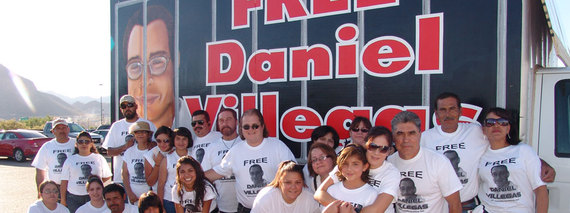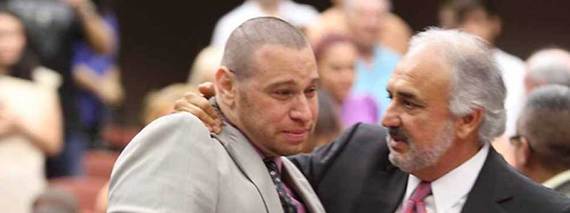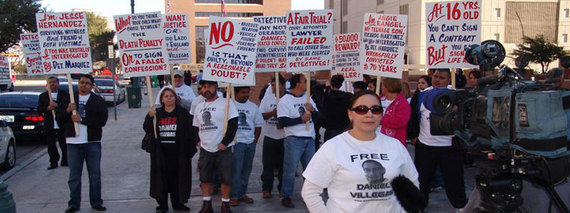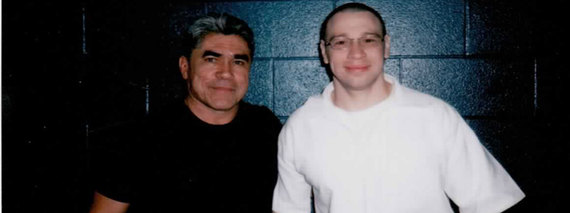Is Daniel Villegas innocent?
According to a district judge, at least 18 alibi witnesses, the jury foreman, one of his alleged shooting victims, the former mayor of El Paso and a local businessman who has turned into his most vocal advocate, the answer is an unequivocal yes.
Daniel Villegas, 36, is serving a life sentence for the shooting deaths of teens Armando "Mando" Lazo, 18, and Robert England, 17, in Northeast El Paso. He has been incarcerated since 1995.
Villegas, who was 16 at the time of the killings, confessed, but claimed immediately after he was separated from then-El Paso police Detective Al Marquez that the confession was aggressively coerced.
Advocate Spearheads Push; District Court Recommends New Trial
Several years ago, John Mimbela, a successful contractor and real estate investor, and devout Catholic, fell in love, got married and adopted his new wife's three daughters. He would hear stories of how their uncle, Daniel Villegas, was an innocent man in prison.
"At first," says Mimbela, "at the beginning, I was skeptical, then I realized after I looked at the facts that he was innocent. I took the paperwork and dealt with it."
With Mimbela's financial aid, Villegas took his case to state district court Judge Sam Medrano Jr., who presides over the 409th District Court. In a powerful rebuke of the foundation of the case against Villegas, Medrano delivered his ruling in favor of the convicted murderer. He recommended a new trial and seriously impeached the validity of the conviction.
"We were delighted with judge Sam Medrano's ruling and praise him for having the courage to do the right thing," says John Mimbela, an El Paso contractor who has been financing the fight to overturn Villegas' conviction. "We were very confident we would get the ineffective assistance of counsel but not the actual innocence because of the politics involved. This is not a technicality -- Daniel is innocent."
District Judge: System Could Lose Credibility
In August 2012, Judge Medrano ruled that Villegas' confession was coerced -- something that Villegas communicated to juvenile officers immediately following his removal from the custody of Detective Marquez.
"For our justice system to work it must make two important promises to its citizens: A fundamentally fair trial and an accurate result," Judge Medrano told a courtroom. "If either of these two promises are not kept, our system loses its credibility, our citizens lose their faith and confidence in our court system, and eventually our decisions and laws become meaningless."
This summer, supporters of Daniel Villegas marched on the Capitol a year to the day of Medrano's ruling, hoping to get the Texas Court of Criminal Appeals to address Villegas' case. Supporters included former El Paso Mayor John Cook, who said he believed Villegas should be granted a new trial, as well as several former death row inmates who lived to be vindicated.
But the appellate court has not so much as set a hearing.
"We were satisfied that Judge Medrano made this recommendation," says Mimbela. "We were quite shocked, not because we don't believe that Daniel is innocent, but because it's not politically correct to do so. We believe that Daniel's case will be one of the first cases where someone who has been wrongfully convicted will be ruled innocent without the DNA evidence."
Villegas would need five out of nine members of the Texas Court of Criminal Appeals -- the state's highest court for criminal cases -- to rule in his favor.
"The sad part is that they are stalling," says Mimbela. "We need to put the pressure on, because the prosecution is delaying justice. The family of Daniel, who've never doubted for a second his innocence, feels that the court is sitting on this case."
At Villegas' evidentiary hearings, his attorneys presented 19 volumes of evidence supporting his innocence over the course of 10 days.
Mimbela has publicly stated that Detective Marquez had a reputation for abuse. He said that Villegas told him that as Marquez took the teenager to court to sign the confession, the detective threatened to, among other things, take the teenager "out into the desert for a beating" if he didn't cooperate. After six hours of interrogation, Villegas said he saw no other way out.
Shooting Survivor: "I believe with all my heart that Daniel is innocent."
On a spring night in 1993, four men, Jesse Hernandez, Juan Carlos Medina and murder victims Armando "Mando" Lazo and Robert England, walked along Electric Avenue. A car with three occupants pulled near, and one passenger shouted out in Spanish slang, "What gang are you with?"
Two of the men fled. While England suffered a single gunshot wound to the head which killed him instantly and Lazo was shot in the abdomen and thigh. His body was found on the doorstep of a home across the street.
Cops found a potential suspect in Villegas, a high school dropout and aspiring gang member who grew up in a harsh section of the city called the "Devil's Triangle;" he had a reputation for concocting stories to boost his street reputation, and apparently he had even joked about his involvement.
Eleven days after the shooting, Villegas was arrested at his house after word circulated that he had taken credit for it.
At the time of the homicide, however, Daniel and others say that he was babysitting with his two best friends.
"Daniel's lawyers didn't call the eyewitnesses, including the mother of one of the kids he was babysitting," says Mimbela.
Two other teenagers, Rodney Williams and Marcos Gonzalez, were also brought in for questioning. According to police, all three of them confessed, naming a fourth man as the driver and a fifth as a co-passenger.
The problem is that both of those men have airtight alibis -- one was at a detention house and the other was under house arrest at the time.
"Both Rodney and Marcos described different events of the shooting and description of the car they were in," says Mimbela.
The only thing the three are consistent on is the false implication of two men who weren't there, either. The reason that three people came up with the same lie is that the police were feeding them the same lie. The court ordered one of the kids' statements to be dropped. They tried dragging him down there to sign a second statement, but his mom provided an attorney. He has since said, 'we didn't do it, it's all a bunch of lies.' The second kid was thrown in jail for three months and the charges were eventually dropped.
One of the survivors of the shooting has come to Villegas' defense. "I believe with all my heart that Daniel is innocent, and he wasn't there," says Jesse Hernandez.
A murder weapon was never found and there was no physical evidence linking him to the crime. Nothing ties Villegas, who has an IQ designated as "mildly retarded" and wrote and read at the third-grade level, to the crime.
The only evidence against him is a confession, and the confession doesn't mirror the facts of the crime.
"Jesse Hernandez is one hundred percent certain that it wasn't Daniel," says Mimbela.
Detective Marquez even accused Jesse of killing his friend, telling him that he may have blacked out. Jesse is convinced the detective did the same thing to do Daniel. When I showed Jesse Daniel's confession, Jesse said that everything about it was wrong, it had the wrong color car, the wrong make and model, and the entire sequence of events was wrong.
Marquez, no longer in law enforcement, has repeatedly refused to comment. El Paso County District Attorney Jaime Esparza prosecuted Villegas in 1994 in a proceeding that ended in a hung jury, and again in 1995, when the jury convicted him of capital murder. He has said that he is still "confident" that Daniel's confession was truthful.
Refused 10-Year Plea Bargain
In a note of bitter irony, before trial, Villegas' court appointed attorney worked out an exceptionally lenient plea deal of 10 years in prison for the double homicide. All Daniel had to do was agree and start doing his sentence.
"Daniel says that even though he never wanted to be labeled a murderer as an innocent man, he could kick himself in the butt for not taking it," says Mimbela (pictured above with Daniel Villegas).
But he didn't believe that this could happen in the United States. He believed in the system. He told the truth every single time, and he couldn't believe that this could happen in America. It took him every ounce of strength not to throw up when he heard the verdict.
Mimbela says he has even considered soliciting a celebrity, sports star or someone with hefty political clout to draw attention to this case.
"We need this to be addressed," says Mimbela. "Each day is one more day that Daniel sits in prison for a crime that he did not commit."
This will be the first of a series of articles by Brian D'Ambrosio for The Huffington Post chronicling the case of Daniel Villegas.




